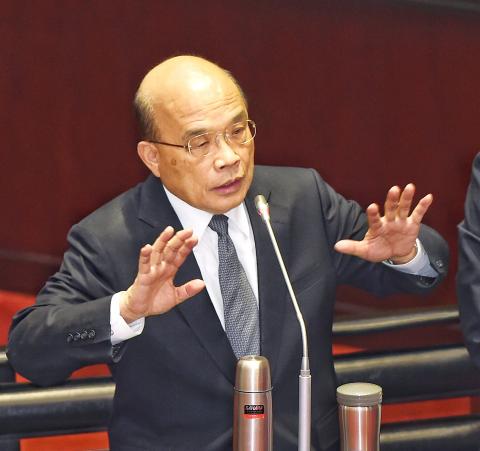Death sentences that have been handed to people in cases in which no further appeals are possible ought to be enforced, Premier Su Tseng-chang (蘇貞昌) said yesterday, adding that he “never protects bad guys.”
The premier made the remarks during an interpellation when Chinese Nationalist Party (KMT) Legislator Shen Chih-hwei (沈智慧) asked Su whether he would execute any of the 40 inmates on death row by the end of this year.
“Since the death penalty is stipulated in the law, it should be enforced where necessary. Even the two covenants [the International Covenant on Civil and Political Rights and the International Covenant on Economic, Social and Cultural Rights] say that the death penalty may be enforced in cases where it is unavoidable,” Su said.

Photo: Fang Pin-chao, Taipei Times
However, Shen said that since he took office more than eight months ago, not one death row inmate has been executed.
Su replied that the decision of whether to execute convicts lies with Minister of Justice Tsai Ching-hsiang (蔡清祥).
Tsai said that the government’s position on the death penalty is to gradually abolish it, and the ministry would carefully review each case when deliberating whether to enforce the death penalty.
Tsai’s response drew criticism from Shen, who said that the Democratic Progressive Party administration has been ambivalent on the matter and is “wasting taxpayers’ money feeding death row inmates” and “protecting bad guys instead of good guys.”
In response, Su said: “I never protect bad guys, nor have I given any orders to stop the execution of death row inmates.”
Shen then cited a driving under the influence (DUI) case in Taichung last year that involved a repeat offender who had been diagnosed with stage-four cancer.
Even though he killed two people while driving drunk, he would not receive a death sentence, Shen said.
She asked Su whether his remark that “drunk driving equals intentional murder” and that the government has “zero tolerance” for drunk driving still stands.
Su said that zero tolerance against drunk driving has always been his stance, adding that the Cabinet submitted proposals stiffen penalties for DUI in the Criminal Code and the Road Traffic Management and Penalty Act (道路交通管理處罰條例), which were passed by the Legislative Yuan.
However, Shen said the strictest punishment a repeat DUI offender can receive under those amendments is life imprisonment.

FALSE DOCUMENTS? Actor William Liao said he was ‘voluntarily cooperating’ with police after a suspect was accused of helping to produce false medical certificates Police yesterday questioned at least six entertainers amid allegations of evasion of compulsory military service, with Lee Chuan (李銓), a member of boy band Choc7 (超克7), and actor Daniel Chen (陳大天) among those summoned. The New Taipei City District Prosecutors’ Office in January launched an investigation into a group that was allegedly helping men dodge compulsory military service using falsified medical documents. Actor Darren Wang (王大陸) has been accused of being one of the group’s clients. As the investigation expanded, investigators at New Taipei City’s Yonghe Precinct said that other entertainers commissioned the group to obtain false documents. The main suspect, a man surnamed

The government is considering polices to increase rental subsidies for people living in social housing who get married and have children, Premier Cho Jung-tai (卓榮泰) said yesterday. During an interview with the Plain Law Movement (法律白話文) podcast, Cho said that housing prices cannot be brought down overnight without affecting banks and mortgages. Therefore, the government is focusing on providing more aid for young people by taking 3 to 5 percent of urban renewal projects and zone expropriations and using that land for social housing, he said. Single people living in social housing who get married and become parents could obtain 50 percent more

DEMOGRAPHICS: Robotics is the most promising answer to looming labor woes, the long-term care system and national contingency response, an official said Taiwan is to launch a five-year plan to boost the robotics industry in a bid to address labor shortages stemming from a declining and aging population, the Executive Yuan said yesterday. The government approved the initiative, dubbed the Smart Robotics Industry Promotion Plan, via executive order, senior officials told a post-Cabinet meeting news conference in Taipei. Taiwan’s population decline would strain the economy and the nation’s ability to care for vulnerable and elderly people, said Peter Hong (洪樂文), who heads the National Science and Technology Council’s (NSTC) Department of Engineering and Technologies. Projections show that the proportion of Taiwanese 65 or older would

Democracies must remain united in the face of a shifting geopolitical landscape, former president Tsai Ing-wen (蔡英文) told the Copenhagen Democracy Summit on Tuesday, while emphasizing the importance of Taiwan’s security to the world. “Taiwan’s security is essential to regional stability and to defending democratic values amid mounting authoritarianism,” Tsai said at the annual forum in the Danish capital. Noting a “new geopolitical landscape” in which global trade and security face “uncertainty and unpredictability,” Tsai said that democracies must remain united and be more committed to building up resilience together in the face of challenges. Resilience “allows us to absorb shocks, adapt under